Mark Savage
Music Correspondent

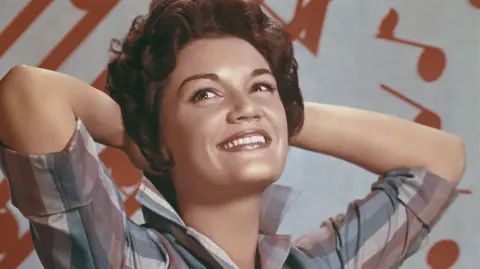 Getty Images
Getty Images
Connie Francis sold millions of records, and was the first female recording artist to top the US Billboard Charts
Connie Francis, who was at one time the world's biggest-selling female artist, has died at the age of 87.
The musician, whose hits included Stupid Cupid and Who's Sorry Now, had recently enjoyed a resurgence after her 1962 song Pretty Little Baby went viral on TikTok.
Francis had recently been treated for pelvic pain caused by a fracture. Her death was first reported by the president of her record label, Ron Roberts, and confirmed to the BBC by Universal Music.
"It is with a heavy heart and extreme sadness that I inform you of the passing of my dear friend Connie Francis last night," Roberts wrote on Facebook.
"I know that Connie would approve that her fans are among the first to learn of this sad news."

 Getty Images
Getty Images
The singer had recently been active on Facebook, updating fans about her health
The star's death comes just months after Pretty Little Baby became a trending song on TikTok.
Millions of people, including Kim Kardashian and Kylie Jenner, lip-synced to the easy listening ballad, while showing off their children and pets, or making displays of affection.
One video, by social media influencers Brooke Monk and Sam Dezz, was watched more than 158 million times.
ABBA singer Agnetha Fältskog also posted the song, saying that Francis had long been her favourite singer. And the actress Gracie Lawrence, who is currently playing Francis in the Broadway musical Just in Time, also shared a video of herself singing the track, while dressed in character.
Speaking last month, Francis said she had been surprised by the sudden success of a track that had originally been a b-side.
"To tell you the truth, I didn't even remember the song!" she told People magazine.
"I had to listen to it to remember. To think that a song I recorded 63 years ago is touching the hearts of millions of people is truly awesome. It is an amazing feeling."

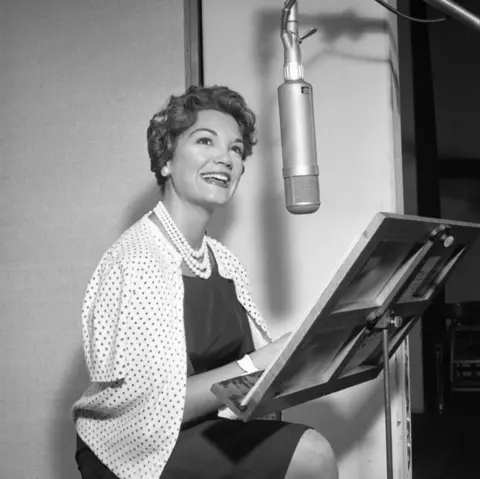 Getty Images
Getty Images
The singer was the biggest-selling female artist in the world in the early 1960s
Francis was born Concetta Rosemarie Franconero and grew up in a working-class Italian American family in Brooklyn, New York.
Encouraged by her father, she started playing the accordion at the age of three. By the time she was a teenager, she had changed her name to Connie Francis, and was making regular appearances on the US TV variety show Startime Kids.
Early attempts to launch a singing career were not successful.
She was turned down by almost every record label, only securing a contract with MGM Records because her demo song was called Freddy - which happened to be the name of the president's son.
Her initial recordings failed to find an audience, and Francis accepted a place to study medicine at university.
But she scored a breakout hit with her last contracted recording for MGM - a cover of the 1923 song Who's Sorry Now?, that she only recorded at her father's insistence.
"I had 18 bomb records," Francis told UPI in 1996. "He wanted me to record a song written in 1923. I said 'Forget about it - the kids on American Bandstand would laugh me right off the show.'
"He said, 'If you don't record this song, dummy, the only way you'll get on American Bandstand is to sit on the TV'."
It was almost prophetic. In 1958, Dick Clark championed the track on American Bandstand, telling viewers: "There's no doubt about it, she is headed straight for the number one spot."
Francis, who was watching at home, had no idea the song was going to feature on the show.
"Well, the feeling was cosmic - just cosmic!" she wrote in her diary that night.
"Right there in my living-room, it became Mardi Gras-time and New Year's Eve at the turn of the century!"
Pop icon turned victims' advocate
Over the next couple of years, Francis became a true pop icon.
She sold millions of records - including teen hits like Lipstick On Your Collar and Everybody's Somebody's Fool.
In 1969, she became the first woman to top the Billboard Top 100, with the bluesy ballad Everybody's Somebody's Fool.
Francis also had an affinity for languages, and was one of the first stars to record in multiple dialects.
Her title song from the 1961 movie Where the Boys Are, for example, was released in seven different languages - English, German, French, Italian, Japanese, Neopolitan and Spanish.
In 1963, she also recorded one of the first known charity singles, In The Summer Of His Years, a tribute to the assassinated US president John F Kennedy.
Her popularity waned in the mid-60s, as acts like The Beatles and Bob Dylan took over the pop charts; and she briefly lost her voice as a result of nasal surgery.

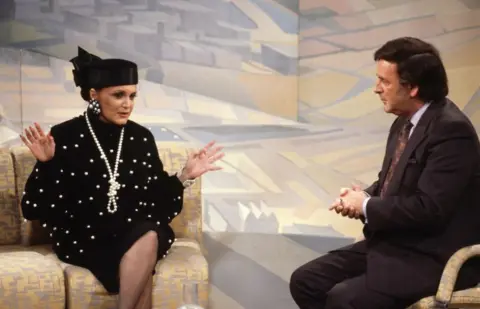
The singer spoke about her rape in a moving interview with Terry Wogan in 1989
In 1974 Francis mounted a comeback at the Westbury Music Fair in New York, but after the performance she was beaten and raped at knife point in her motel.
Traumatised, she became a recluse and spent several spells in psychiatric hospitals (she later said she had been admitted against her will by her father).
At her lowest point, the star tried to kill herself with sleeping pills.
"I just felt that there was nothing for me to live for," she told Terry Wogan on his BBC One chat show in 1989.
"I had this free-floating fear of life in general after the rape, and I just said, 'Well, that's it, I'm going to check out'."
Francis said it was her adopted son, Joey, who saved her life.
"I was looking at this bottle of sleeping pills... and my son knocked at the door of the bathrooom and he said, 'Mommy, you're the best mommy I ever had'," she told Wogan.
"And that was it. I took the pills and threw them right down the toilet."
The singer later won $1.5 million (£1.1 million) in a lawsuit against the Howard Johnson's motel chain for failing to provide safe locks on the glass door through which her attacker entered.

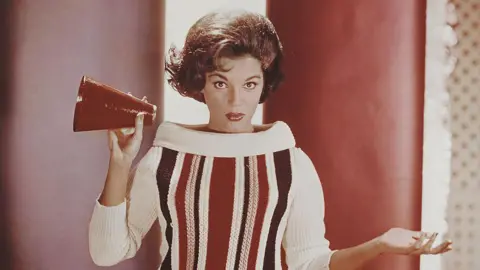 Getty Images
Getty Images
The musician recorded more than 70 albums over her career
Francis had just begun her return to the stage in 1981 when her younger brother George Franconero, who had testified against the mafia, was shot to death in front of his house.
The incident plunged her deeper into depression, and she spent much of the next decade receiving treatment, during which time she was diagnosed with bipolar disorder.
However, she also became a prominent voice in crime victims' advocacy groups, including Women Against Rape, and the Victims' Assistance Legal Organisation, and became a spokesperson for Mental Health America.
She resumed her recording career in 1989, and continued to sing for sold-out audiences until she was in her 70s.
Earlier this month, she told fans she had been admitted to hospital due to ongoing hip pain, but remained in good spirits.
Her death came after a short illness, said her friend and label boss Ron Roberts, adding that more details would be released at a later date.
Looking back over her life and career in 2010, she said that "with the exception of my brother's murder, I would do it all over again.
"Because although there were some terrible lows, there were also exhilarating highs that I would have never felt in any other profession."
.png)
 4 months ago
18
4 months ago
18
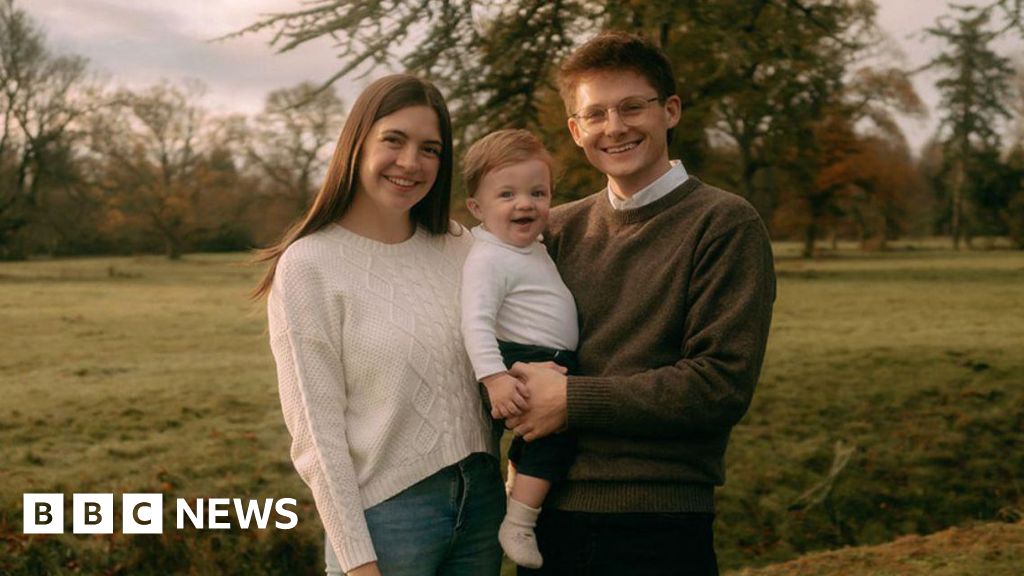







 English (US) ·
English (US) ·